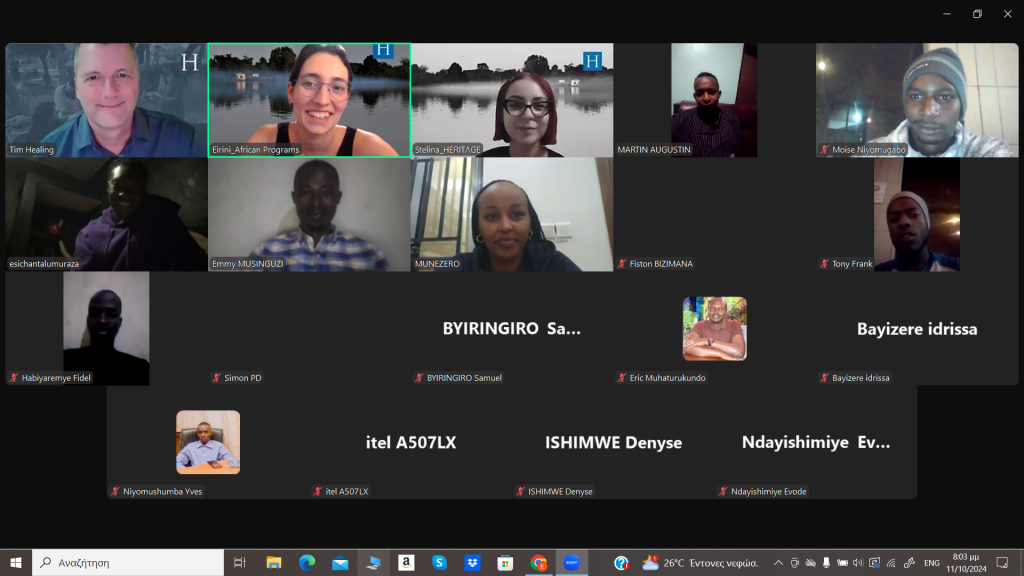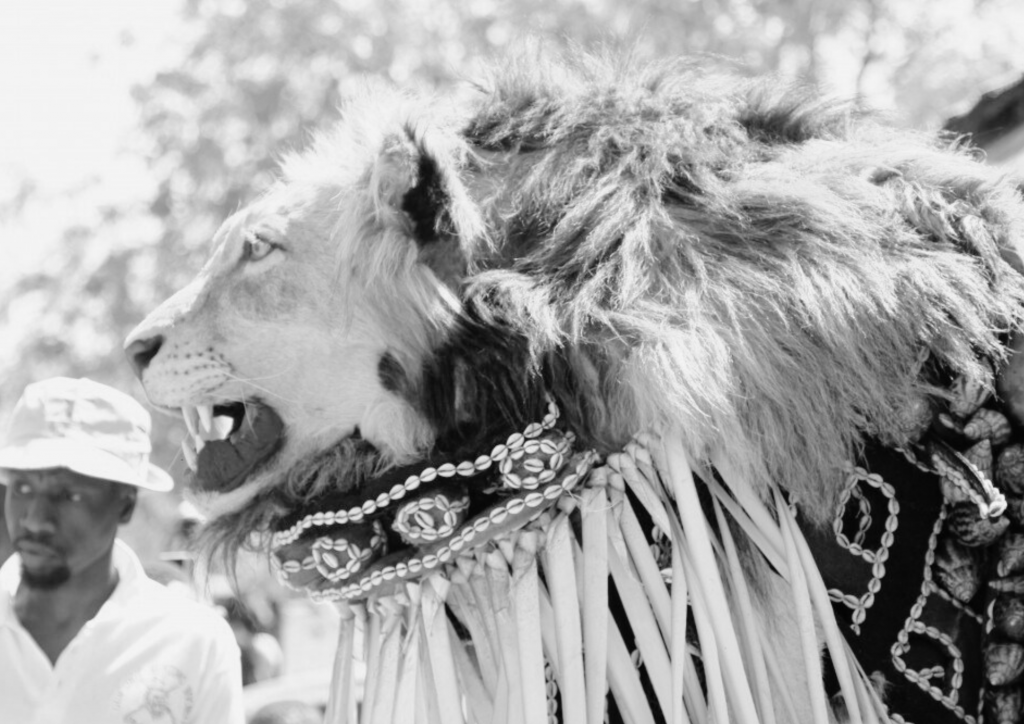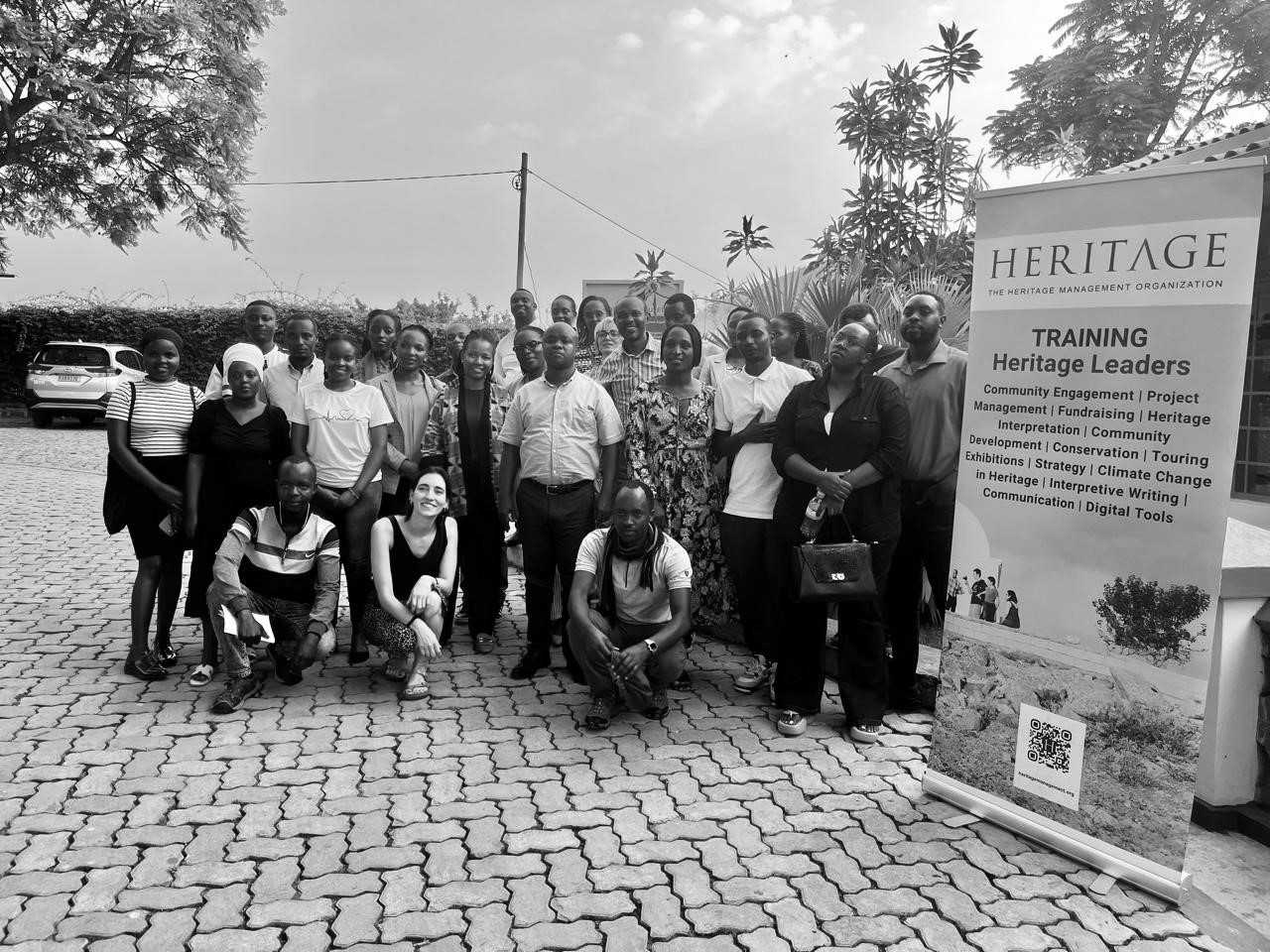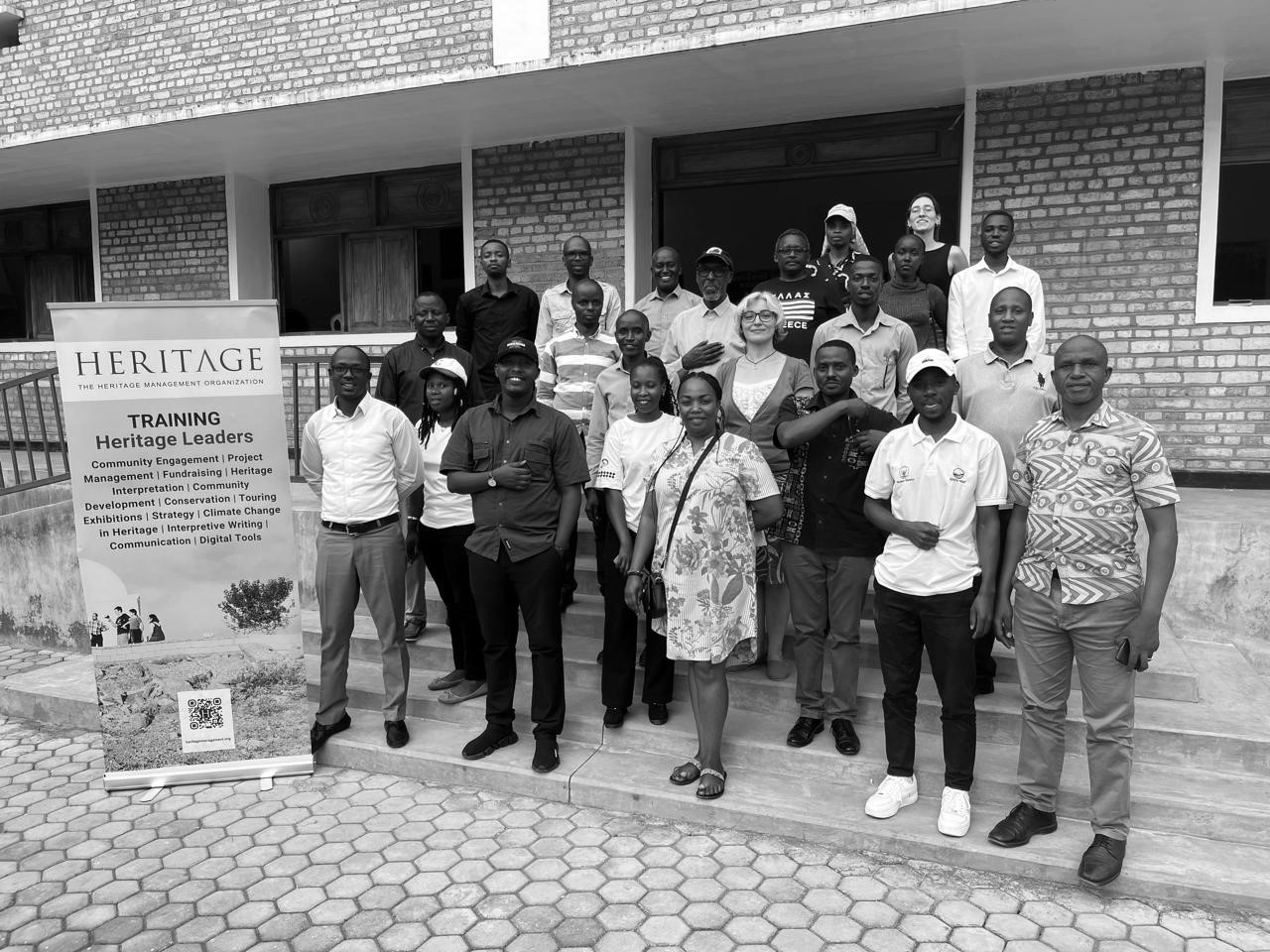: Workshops
A Street Art Workshop in The Gambia
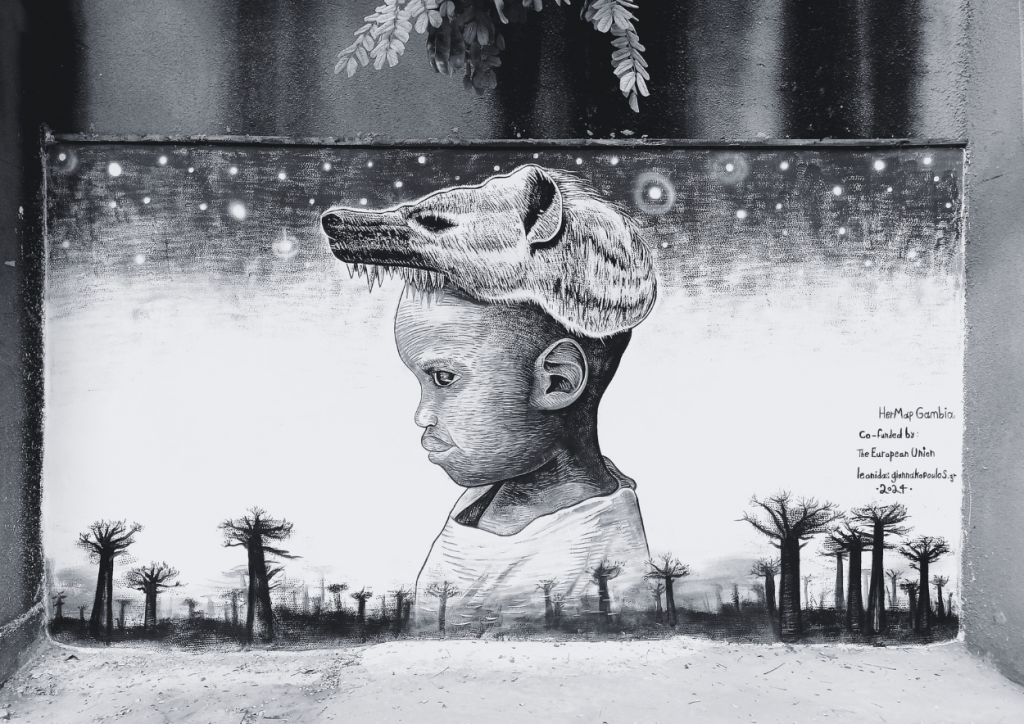
Mural by Leonidas Giannakopoulos, created for the NCAC premises in Banjul, in the framework of HerMaP Gambia, an initiative co-funded by the EU.
From 23rd October to 1st November, HERITΛGE held a Street Art Workshop in the Gambia. Street art serves as a vibrant and dynamic medium to bring history, culture, and identity to life and the workshop aimed to emphasize the power of creative expression in preserving and showcasing cultural heritage. The workshop was led by Leonidas Giannakopoulos*, a Greek artist whose murals adorn a number of central buildings in Greece and beyond. Giannakopoulos also created a mural for the premises of The Gambia’s National Centre for the Arts and Culture (NCAC) during the workshop.
The training is part of HerMaP Gambia, an initiative co-funded by the EU that aims to enrich the understanding and appreciation of Gambian cultural heritage while enhancing the capacity of key stakeholders in the cultural sector. HERITΛGE has been working with the street artists of Galloya, a creative team of young locals that has also put together a local festival, for the past two years in the framework of HerMaP Gambia.
Nine participants from around The Gambia joined the ten-day workshop where they delved into the history, significance, and key movements of graffiti and street art. Through this initiative, the program highlighted the importance of art as both a cultural tool and a means of celebrating and preserving heritage in a living, evolving form.
The workshop explored how cultural heritage can be commemorated through artistic representation, ensuring that elements of heritage resonate with the present generation. They also focused on practicing essential techniques like stencilling and design principles. On the third day, they focused on personal production, allowing each participant to create their own unique artwork.
“I really enjoyed the big thirst for knowledge all our participants had and I hope everything I showed them and taught them was inspiring. I believe they will use all this knowledge because I saw a big thirst for artistic expression. In their next works I believe they will apply all the things that they learned and they will keep on learning!” said trainer Leonidas Giannakopoulos.
Participants were enthusiastic and fully engaged, producing creative and thought-provoking street art reflecting local culture. “The knowledge and skills we gained during this experience have been truly invaluable” said Amadou Mousa, a street artist from Galloya and one of the founders of the local festival. “Leonidas’ guidance has not only enhanced our artistic abilities but also inspired us to explore new ways of expressing creativity within our community,” he added.
Following this intensive workshop, an additional five days were devoted to the creation of a public artwork at the NCAC premises. During this time, participants observed advanced techniques and engaged closely with the detailed process of producing impactful public art. They gained hands-on experience in conceptualization, production, and project management, enhancing their appreciation for the commitment and precision behind large-scale street art projects.
“I wanted to create an artwork that refers to the people here in The Gambia, to the country’s young people that bring the future,” said Giannakopoulos. “So I wanted to paint the portrait of a young child from the area of Banjul and express the culture of this country by painting him with a mask of a hyena over a landscape of baobab trees, a very powerful tree that gives so many things to the people, it is not only about food or drink but is also spiritual.”
*Leonidas Giannakopoulos studied painting and printmaking at the School of Ffine Arts of Athens, and has since been commissioned to paint several murals for municipalities, festivals, public buildings and private companies around the world.
**Photos by Leonidas Giannakopoulos, Nefeli Papanagiotou, and the HerMaP Gambia team and beneficiaries in The Gambia
Project Management Workshop in Rwanda
In October, heritage managers from fifteen institutions across Rwanda joined us online for our Project Management for Heritage Managers Workshop. The course aims to help stakeholders build a better understanding of how to effectively run heritage projects from inception to closure, including evaluation.
HERITΛGE’s Tim Healing started the programme by introducing the basic principles and tools of project management using four case studies from Ghana, South Africa, Niger and Sudan. Participants then focused on specific skills including budget planning, risk management, monitoring and grant writing in the planning and implementation phases of projects. Instructions were then given for the requirements of the final project which will be submitted in groups.
The 22 participants included officials from the Ministry of National Unity and Civic Engagement (MINUBUMWE), the Rwanda Cultural Heritage Academy, the Rwanda Metereology Agency, Kigali Independent University, Rwanda Queen’s Museum, Mfura foundation, the Rwanda Digital Cultural Archive and Rwanda History Archives (Heritage Hub), Amatha Tech/ Rwanda Digital Heritage Platform, RWANDA cultural Library, NZIZA NGO, Golden Class Travel Agency, Art & Travel Ltd, Bwishyura Kivu Boat Cooperative, and Marti’s public secretariat Ltd.
The course was well received and participants showed great interest in how to manage a project and attract potential funders.
The workshop’s focus on real-life case studies also provided actionable insights, which I can implement in ongoing projects.
“Learning how to balance heritage conservation with sustainable development, while involving local communities, was particularly valuable. The workshop’s focus on real-life case studies also provided actionable insights, which I can implement in ongoing projects.” said Aime Ntyonagize, Founder and Director of Amatha Tech/ Rwanda Digital Heritage Platform.
Personally, I liked how very experienced the instructor is in Project Management.
“Personally, I liked the way the instructor is very experienced in Project Management, impressive topics, facilitations and explanations from the trainers etc. To be precise and concise, what I liked most is the project management skills and qualities of a good project manager that I gained from the instructors and facilitators during the course. It was so impressive and fantastic,” said Emmy MUSINGUZI, Genocide Memorials & Site management Officer / Bisesero memorial site
Tim Healing is our interim director of African Grants, and capacity development officer helping small heritage organizations in Africa develop an application and ensure they manage their grant efficiently. Tim has over thirty years’ experience working as a project manager and has a professional background in project management, community and NGO development.
For more information about HERITΛGE’s workshops, go to our open courses page, or follow us on Facebook, Twitter / X, LinkedIn or Instagram.
Festival Management Training in The Gambia
Over 16th and 17th of October, 27 participants from 10 institutions across Gambia joined us for the Festival Management and Operations Training. The two-day course aimed at enhancing participants’ understanding of essential concepts and practices to create impactful, well-organized, and environmentally conscious festivals that engage and benefit their communities.
It was led by Hanine-K Lakkis, a cultural specialist, events director, and trainer, and Mina Morou, The Gambia Programmes Manager for HERITΛGE.
The training is part of HerMap Gambia, an initiative co-funded by the EU that aims to enrich the understanding and appreciation of Gambian cultural heritage while enhancing the capacity of key stakeholders in the cultural sector. It was developed in direct response to requests from five distinct festival organizing groups seeking our expertise to enhance their event planning and management skills. Recognizing the unique challenges and opportunities within festival management, HERITΛGE designed this program to equip participants with essential skills in festival planning, marketing, operations, safety, and sustainability.
By addressing these core areas, HERITΛGE aims to strengthen the capacity of local actors to create impactful, well-organized, and environmentally conscious festivals that engage and benefit their communities. This tailored approach ensures that participants can meet both their organizational goals and the growing expectations of their audiences.
On the first day, participants from Kankurang, Wassu Stone Circles, Niumi Fort Bullen, Roots, Galloya Street Art Festivals as well as Kubuneh and Galloya Cultural Festivals and National Centre for the Arts and Culture (NCAC), Gambia Tourist Board, the Gambia Youth Chamber of Commerce and independent organizers were instructed in the fundamentals of festivals, including their types, purposes, and impacts, along with detailed guidance on planning aspects such as venue selection, programming, and marketing strategies. On the second, they went over operational considerations, such as risk and crowd management, and sustainable practices to minimize environmental impact.
“I want, on behalf of the National Centre for Arts and Culture, to express our sincere appreciation to the Heritage Management Organization and all the Facilitators for offering this valuable training opportunity to our festival organizers,” said Sanna B. Jarju, Head of the Department for Literature, Performing and Fine Arts of the NCAC.
“The training is done at a time when there are a large number of emerging community-based festivals, most of whom strive for sustainability…Festivals are an important way to safeguard our cultural heritage and enable the attainment of the UN Sustainable Development Goals in The Gambia,” he added.
HERITΛGE in the News
Our teams are working around the world to fulfill the HERITΛGE mission. Here is how some of our work has been featured in the press in the last few months.
Heritage Threatened by Conflict
HERITΛGE has launched a new project to safeguard Ukraine’s cultural heritage. Architectural Heritage Preservation in Times of War: The Ukrainian Model is being realized in cooperation with the Kharkiv School of Architecture and Skeiron, with generous support from the U.S. Embassy’s Public Diplomacy Section in Ukraine. The project has been featured in the latest issue of Popular Archaeology as well as in Ukrainian media.
HerMaP Gambia
The Gambia’s National Assembly’s Committee for Culture and Tourism recently embarked on a Parliamentary Study Tour in Thessaloniki. This visit, conducted as part of the HerMaP Gambia program co-funded by the European Union, was widely covered in the Gambian media, including prominent news programs and The Voice newspaper.
Watch the QTV bulletin (start at 14:18) or read the article in The Voice.
HERITΛGE also delivered workshops in The Gambia on various aspects of cultural management, including Festival Management, which was covered by The Voice.
African Heritage Grants
HERITΛGE’s small grants for African heritage initiative, supported by the Mellon Foundation, recently funded Restoring Ilukwe House, a project by the NGO Legacy to restore a historic building in Lagos’ railway compound. Coverage of this initiative appeared in Nigeria’s The Guardian.
The Republic, a Nigeria-based magazine and platform of socio-economic and political commentary, criticism and cultural discourse, has received a substantial grant from the Mellon Foundation to support its mission to establish itself as a regional, leading hub/platform for Black and Africa-focused ideas and critical perspectives; and to further connect Africa and the African diaspora on critical issues, with the help of HERITΛGE.
Greek Living Heritage Network
As a founding member of the Living Heritage Network in Greece, HERITΛGE continues to support and celebrate Greece’s living heritage. Theodosia Maroutsi recently discussed the Network on NaMaste, a cultural program on Greece’s national broadcaster ERA2.
Greek speakers can listen to the show here.
Heritage Interpretation In Rwanda
49 heritage professionals from Rwanda took part in two recent Introduction to Heritage Interpretation Workshops, led by HERITΛGE’s Valia Stergioti. The participants included officials from educational institutions, heritage sites, tourist businesses, local communities and NGOs.
During the workshop, which was led in person by HERITΛGE’s Valya Stergioti, they were introduced to the skills that allow heritage managers to transform mere phenomena into captivating experiences. They learned how to evoke a deep resonance within visitors at heritage sites of natural and/or cultural significance, guiding them towards profound insights and nurturing an appreciation for all aspects of heritage. Additionally, participants developed the ability to provide and receive constructive feedback to and from their peers.
The first of the two workshops was delivered in cooperation with the Rwanda Cultural Heritage Academy to 26 heritage and tourism professionals and took place on 24-26 July at the Rwanda Heritage Hub and the Kandt House Museum in Kigali.
“I learned to connect our participants to the site, which will help to increase our visitors satisfaction” said Esther Kakuze, Managing Director of ImuHira Ecotourism Rwanda who took part in the workshops.
“My project and institution will benefit through my professional practice,paying attention to all details related to heritage Management and community engagement,” said Wilhelm Mugiramahoro, Operations Officer for the Rwanda Cultural Heritage Academy.
The second workshop was delivered in cooperation with Nyanza District to 23 heritage and tourism professionals in the Nyanza District’s Visitor Centre.
“I have gained new skills as the heritage interpretation workshop was a new subject to me. I will use them so my visitors can enjoy our site and be our ambassadors, ” siad Sandrine Uwambayinkindi from the Girampuhwe Visitor Centre.
Both workshops are part of our HerMaP Africa program which is realised with the generous support of the Mellon Foundation’s Humanities in Place program.
New Training Calendar: Online Workshops for Heritage Managers
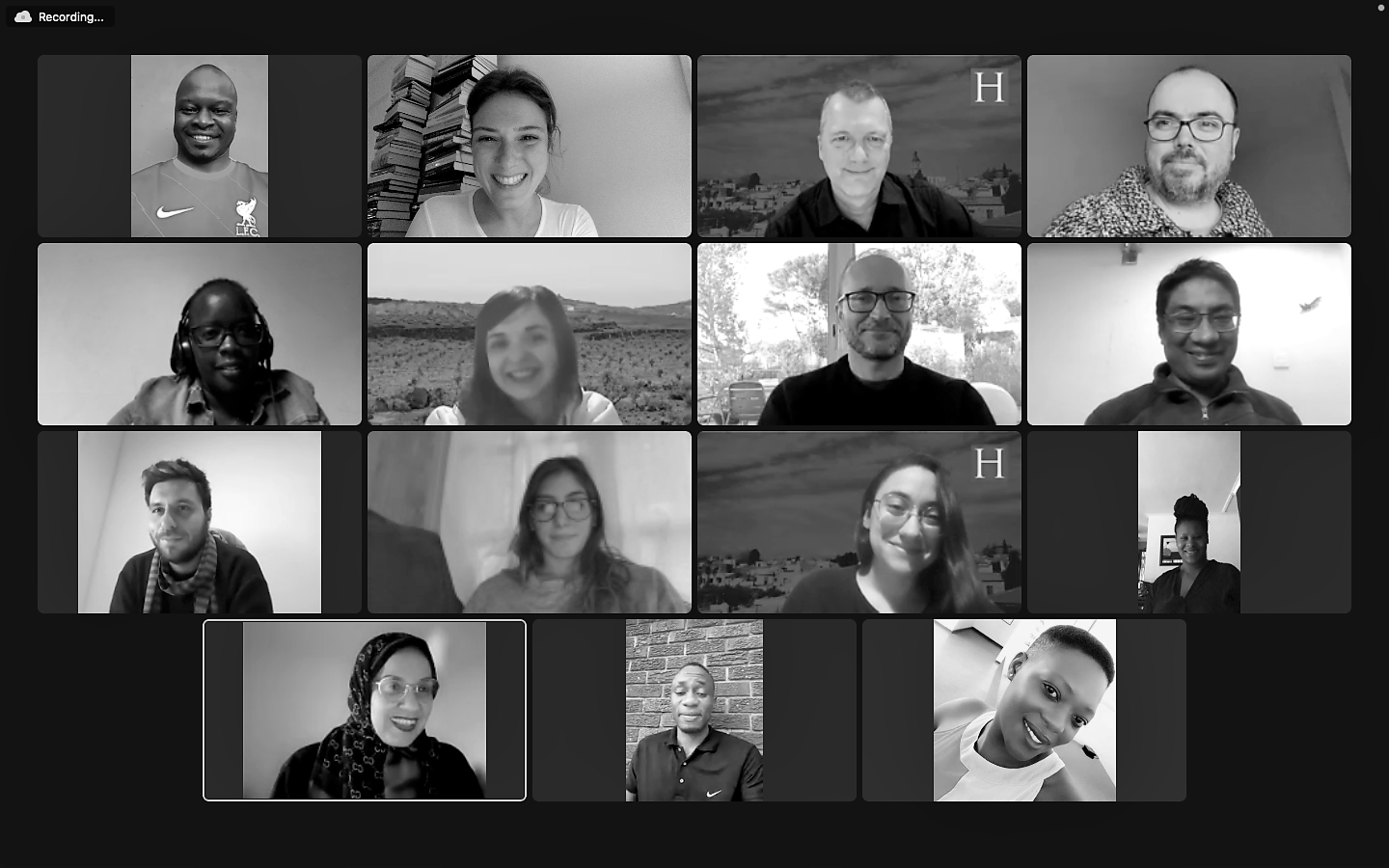 The Heritage Management Organization (HERITΛGE) is happy to announce a series of online training workshops for heritage professionals and caretakers for 2024-2025. A variety of scholarships and funding opportunities are available. As places are limited, candidates are advised to apply as soon as possible.
The Heritage Management Organization (HERITΛGE) is happy to announce a series of online training workshops for heritage professionals and caretakers for 2024-2025. A variety of scholarships and funding opportunities are available. As places are limited, candidates are advised to apply as soon as possible.
Online Workshop Calendar 2024-2025
Introduction to Heritage Interpretation for Site Managers | 01–03 October 2024
Master the principles of high-quality heritage interpretation and gain hands-on experience in implementing them at your site/organization in order to create meaningful and unforgettable experiences for visitors.
Engaging Communities in Cultural Heritage | 11–13 October 2024
Understand the community engagement process, a key heritage management strategy. Master the challenges of working with local communities discern between communities and audiences and understand audience segmentation, get introduced to ethnographic approaches to creating collaborative research-based programs, and learn the methods and techniques of oral history to elicit and document tangible and intangible heritage.
Conservation III: Preventive Conservation (pilot) | 15-17 November
A pilot workshop only open to heritage managers that have previously completed Conservation II: First Aid for Finds.
Interpretive Writing for Natural and Cultural Heritage | 25–27 November 2024
Learn how to write text that grabs and holds the reader’s attention. Discover and practice a wide range of techniques to engage visitors and master the techniques of interpretive writing. Participants will work to become a HERITΛGE-accredited Interpretive Writer, after successfully completing, and being assessed on, the exercises and activities.
Project Management for Heritage Managers | 13-15 December 2024
Gain the skills and knowledge to run a successful project from inception, through the planning and implementation phases to closure. Create a work breakdown structure, a critical path diagram and a Gantt chart. Research potential funders and write a grant application. Improve personal time management skills. Learn to think critically, identify risks and create solutions.
Organising Temporary Exhibitions from your Collections and Touring Strategies | 14–16 February 2025
The focus of this workshop is to give you the skills to ensure temporary, touring and partnership exhibitions can enhance and promote your institution’s mission, create new audiences and mutually beneficial partnerships. Attendees are encouraged to bring their own exhibition ideas to the workshop for discussion and development.
Communication Strategy and Strategic Marketing for Cultural Organizations | 07-09 March 2025
Join a focused learning experience that provides a systemic approach to successfully attract key audiences’ attention through traditional, new, and social media. Acquire a working guide to effectively communicate news, initiatives, and announcements of your organization and manage communication around a crisis or issue.
Successful Fundraising for Heritage Managers: Strategies and Best Practices | 28-30 March 2025
Start-up and build an organization’s contributed revenue to increase its impact in the world. Participants learn best practices and apply them to create the case for support and letter of inquiry for their own organization or project. Workshop sessions combine live and asynchronous lectures, case studies, class discussions and interactive exercises.
Conservation I: Introduction to the General Principles of Cultural Heritage Conservation | 4-6 April 2025
Learn the fundamentals, the ethics, the evolution, and the contemporary international context of conservation. At the end of the course, participants will be able to understand the potential of conservation, together with the processes which are necessary to maximize it.
Strategic Planning for Heritage Managers | 9-11 May 2025
Successful strategy can lead to success and this course will provide participants with the tools and methodologies to successfully formulate and implement strategy in organizations managing cultural heritage. Learn the methods and tools of strategic analysis that will enable you devise and evaluate alternative strategic choices and comprehend the demands of a strategy implementation project.
More workshop dates will be announced soon. To apply visit our Executive Leadership Training page.













